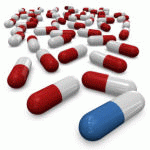Pharmacology
|
24 may 2019 22:00:38 |
| Marine Drugs, Vol. 17, Pages 307: Marine Bacteria, A Source for Alginolytic Enzyme to Disrupt Pseudomonas aeruginosa Biofilms (Marine Drugs) |
|
Tweet Pseudomonas aeruginosa biofilms are typically associated with the chronic lung infection of cystic fibrosis (CF) patients and represent a major challenge for treatment. This opportunistic bacterial pathogen secretes alginate, a polysaccharide that is one of the main components of its biofilm. Targeting this major biofilm component has emerged as a tempting therapeutic strategy for tackling biofilm-associated bacterial infections. The enormous potential in genetic diversity of the marine microbial community make it a valuable resource for mining activities responsible for a broad range of metabolic processes, including the alginolytic activity responsible for degrading alginate. A collection of 36 bacterial isolates were purified from marine water based on their alginolytic activity. These isolates were identified based on their 16S rRNA gene sequences. Pseudoalteromonas sp. 1400 showed the highest alginolytic activity and was further confirmed to produce the enzyme alginate lyase. The purified alginate lyase (AlyP1400) produced by Pseudoalteromonas sp. 1400 showed a band of 23 KDa on a protein electrophoresis gel and exhibited a bifunctional lyase activity for both poly-mannuronic acid and poly-glucuronic acid degradation. A tryptic digestion of this gel band analyzed by liquid chromatography-tandem mass spectrometry confirmed high similarity to the alginate lyases in polysaccharide lyase family 18. The purified alginate lyase showed a maximum relative activity at 30 °C at a slightly acidic condition. It decreased the sodium alginate viscosity by over 90% and reduced the P. aeruginosa (strain PA14) biofilms by 69% after 24 h of incubation. The combined activity of AlyP1400 with carbenicillin or ciprofloxacin reduced the P. aeruginosa biofilm thickness, biovolume and surface area in a flow cell system. The present data revealed that AlyP1400 combined with conventional antibiotics helped to disrupt the biofilms produced by P. aeruginosa and can be used as a promising combinational therapeutic strategy. |
| 90 viewsCategory: Biochemistry, Molecular Biology, Pharmacology |
 Marine Drugs, Vol. 17, Pages 308: Characterization of an Alkaline Alginate Lyase with pH-Stable and Thermo-Tolerance Property (Marine Drugs) Marine Drugs, Vol. 17, Pages 308: Characterization of an Alkaline Alginate Lyase with pH-Stable and Thermo-Tolerance Property (Marine Drugs)Marine Drugs, Vol. 17, Pages 306: Synthetic Pinnatoxins A and G Reversibly Block Mouse Skeletal Neuromuscular Transmission In Vivo and In Vitro (Marine Drugs) 
|
| blog comments powered by Disqus |
MyJournals.org
The latest issues of all your favorite science journals on one page
The latest issues of all your favorite science journals on one page



